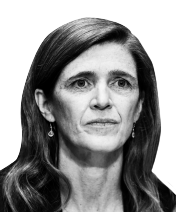
To access the Biden Power Map, sign up for FP Insider, a data-driven subscription service from Foreign Policy that gives professionals critical insights into the global issues impacting their business.
FP Insiders get full access to this and all Power Maps and Special Reports created by FP Analytics, Foreign Policy’s research division.
We work closely with organizations from all sectors to activate FP Insider access at scale—and at maximum savings. Learn more and request an FP Insider demo.
Immigration & Asylum
The Biden Power Players
UPDATED August 19, 2021-

Merrick Garland
Attorney General, U.S. Department of Justice
Relevance to the Biden Agenda:
As the U.S.’s chief legal officer, the attorney general is responsible for overseeing the U.S. Department of Justice, which has the legal authority to make final rulings on immigration cases through the Executive Office of Immigration Review. The attorney general has the power of “referral and review,” which grants them the right to refer immigration cases to themselves and independently make final rulings. Under the former Trump administration, attorneys general referred a record seventeen immigration cases to themselves, issuing a series of rulings that sharply limited the legal requirements for granting asylum.
Biography:
Garland served as the chief judge of the U.S. District Court of Appeals for the D.C. Circuit from 2013 to 2020, and as the principal associate deputy attorney general at the Department of Justice (DOJ) from 1994 to 1997. While at the DOJ, Garland supervised the high-profile investigations into the domestic terrorism cases against Ted Kaczynski and against Eric Rudolph for the bombings in Oklahoma City and Atlanta. In 2016, former President Obama nominated Garland to the U.S. Supreme Court, but Senate Majority Leader Mitch McConnell refused to hold a confirmation hearing. In his confirmation hearing for attorney general, Garland spoke out against the former Trump administration’s family-separation policy, calling it “shameful,” and pledged to support efforts to reunite migrant children with their families. Additionally, Garland expressed serious concern over the backlog of immigration cases that had accumulated under the previous administration. Despite a long career serving as federal judge, Garland does not have significant experience ruling on immigration cases.
Points of Interest and Notable Connections:
Garland has served as a federal judge for the past 20 years, establishing a reputation as a centrist and a moderate consensus-builder. Early in his career, Garland clerked for liberal U.S. Supreme Court Justice William Brennan before moving on to serve as special assistant to Attorney General Benjamin Civiletti from 1979 to 1981 during former President Jimmy Carter’s administration. His rulings tend to lean right on criminal justice matters, but Garland has ruled to the left in cases addressing racial bias in the workplace and prisoners claiming illegal detention or mistreatment. Among his most notable rulings was his decision on the merits of a Freedom of Information Act (FOIA) request made by the American Civil Liberties Union (ACLU) to the Central Intelligence Agency (CIA), in which he ruled against the CIA. Garland’s decision required the CIA to turn over documents about its secretive drone policy, which it had not previously acknowledged. At the time of the ruling, Avril Haines, then deputy director of the CIA, was the foremost advisor on the legality of the targeted drone strikes within the agency. As a high-profile judge, many of Garland’s law clerks have gone on to hold significant positions in government, such as Daniel Hornung—now a prominent economic advisor to President Biden—who served as one of Garland’s clerks in his last term on the U.S. Court of Appeals for the D.C. Circuit.
-
Vanita Gupta
Associate Attorney General, U.S. Department of Justice
-
Pamela Karlan
Principal Deputy Assistant Attorney General, Civil Rights Division, U.S. Department of Justice
-
Lisa Monaco
Deputy Attorney General, U.S. Department of Justice
-
-

Alejandro Mayorkas
Secretary of Homeland Security, U.S. Department of Homeland Security
Relevance to the Biden Agenda:
As the main department for immigration enforcement, the Department of Homeland Security (DHS) will be largely responsible for carrying out many of the key policies on President Biden’s immigration agenda. After being backed by the U.S.’s largest police union, Mayorkas will now be faced with balancing calls for immigration reform and reversing the Trump administration’s policies, securing U.S. borders, and handling a steady flow of immigrants and asylum seekers from Central America.
Biography:
Under the Obama administration, Mayorkas served as the director of U.S. Citizenship and Immigration Services (USCIS) from 2009 to 2013 and then as deputy secretary of DHS from 2013 to 2016. In his early career, Mayorkas served as an assistant U.S. attorney in the Central District of California in 1989, specializing in the prosecution of white-collar crime. In 1998, he was appointed by former President Bill Clinton as the United States Attorney for the Central District of California, becoming the country’s youngest U.S. Attorney. A Cuban immigrant and the son of refugee parents, Mayorkas will be the first immigrant as well as the first person of Latino heritage to hold the position of DHS secretary.
Points of Interest and Notable Connections:
Mayorkas helped to conceive and implement the Deferred Action for Childhood Arrivals (DACA) legislation under the former Obama administration but was also a key DHS official during the period with the highest deportation numbers in U.S. history. Mayorkas’s past work has indicated both a commitment to providing and expanding legal paths to U.S. citizenship and a willingness to extensively prosecute illegal immigration. During his time at the DHS under the Obama administration, Mayorkas implemented a number of reforms to help secure and modernize the immigration process, including negotiating cybersecurity and homeland security agreements with foreign governments and creating the Fraud Detection and National Security Directorate.
-
Ur Jaddou
Director, U.S. Citizenship and Immigration Services, U.S. Department of Homeland Security
-
Charanya Krishnaswami
Senior Counselor for Immigration, U.S. Department of Homeland Security
-
John Tien
Deputy Secretary of Homeland Security, U.S. Department of Homeland Security
-
-

Samantha Power
Administrator, U.S. Agency for International Development
Relevance to the Biden Agenda:
Immigration & Asylum:
Biden has placed an emphasis on addressing the root causes of migration. Coordinating international aid efforts will play a critical role in mitigating conditions in regions generating the most refugees and asylum seekers. Under the Biden administration, the USAID is set to play a more prominent role, as Biden has elevated the director position to be included on the National Security Council. Power is set to oversee extensive global humanitarian aid and development efforts across fragile regions such as Central America, as well as Myanmar and Syria.
Climate Change:
Power has emphasized the disproportionate burden that the climate crisis places on underprivileged and low-income communities, and she is focused on mitigating the potential of the climate crisis to displace populations, increase starvation, and destabilize struggling economies. She was an adamant advocate for the U.S. rejoining the Paris Agreement and has voiced support for President Biden’s goal of the U.S. reaching net-zero greenhouse gas emissions by 2050. Through USAID, Power will help coordinate funding for a wide-range of climate initiatives, including reforestation and carbon sequestering, drought-resistant crop development, and easing the impact of extreme weather events.
Pandemic Response:
Congress approved $5 billion in additional funding for USAID to help support its global COVID-19 response, which has distributed aid to over 120 countries since the onset of the pandemic. Power is working with other top administration officials to coordinate U.S. assistance to India during its recent COVID-19 case surge, and USAID will be responsible for managing a $4 billion contribution to Gavi, The Vaccine Alliance—an international vaccine-distribution network. She will also focus on addressing the exacerbating impacts of COVID-19 on humanitarian issues globally, such as poverty and malnutrition.
Biography:
Power worked as a journalist in Yugoslavia, Rwanda, and other nations facing humanitarian crises throughout the 1990s and was the primary architect of the “responsibility to protect” model of international intervention. She served as a member of the National Security Council (NSC) and U.S. representative to the United Nations during the Obama administration, where she was an advocate for U.S. military intervention in the Libyan and Syrian civil wars. In each of her roles, Power has placed a strong emphasis on protecting human rights internationally, believing that military intervention was necessary to protect civilians who were being prosecuted by their governments. In 2012, she established the White House’s Atrocities Prevention Board, which was meant to mitigate humanitarian crises. Power has criticized both Russia and China, vocally condemning Russia’s 2014 invasion of Ukraine, Russian election interference, and China’s treatment of its Muslim Uighur population. She has also spoken out against President Trump’s immigration policies, particularly its family-separation policy.
Points of Interest and Notable Connections:
Power’s early career as a journalist in war zones like Bosnia and Herzegovina and Rwanda during the 1990s molded her strong belief in the benefits of liberal interventionism. As a member of the NSC and the U.S. representative to the UN during the Obama administration, Power advocated for U.S. interventions in the Central African Republic, Egypt, Iraq, Libya, Sudan, Syria, and Ukraine. Power and former U.S. representative to the U.N. Susan Rice became close allies, pushing for U.S. military intervention in Libya in 2011 over concerns of an impending civilian massacre. She was an especially strong advocate for an arms embargo in South Sudan during the South Sudanese civil war and cites the failure to impose an arms embargo in 2016 as one of her greatest regrets as UN representative.
For her first trip as U.S. representative to the U.N., Power traveled to the Central African Republic with Linda Thomas-Greenfield, becoming the highest-ranking U.S. official to visit that nation. In 2014, Power, Rice, and former Secretary of State John Kerry led the recruitment efforts for the military campaign against ISIS in Iraq and Syria. During that campaign, Power often advocated for a stronger U.S. military response to ISIS to prevent a humanitarian disaster, a view that aligned her with General Lloyd Austin, then head of CENTCOM. Power has vocally called out Russian aggression in Ukraine and Syria, and her final major speech as U.N. ambassador highlighted Russia’s activity as a potentially destabilizing threat to the current rules-based world order. After serving in the Obama administration, Power joined the faculty at the Harvard Kennedy School and taught alongside Wendy Sherman and Nicholas Burns. She also worked for the Albright Stonebridge Group, where Thomas-Greenfield headed the Africa Practice.
-
Marcela Escobari
Assistant Administrator for Latin America and the Caribbean (Nominee), U.S. Agency for International Development
-
Jeffrey Feltman
Special Envoy for the Horn of Africa, Bureau of African Affairs, U.S. Department of State
-
Jeremy Konyndyk
Senior Advisor for COVID-19, Office of the Administrator, U.S. Agency for International Development
-
Ryan McCannell
Director, Center for Conflict and Violence Prevention, U.S. Agency for International Development
-
-

Ken Salazar
U.S. Ambassador to Mexico (Nominee), U.S. State Department
Relevance to the Biden Agenda:
During Biden’s first 100 days in office, he did not name an official U.S. ambassador to Mexico. Instead, he appointed former U.S. ambassador to Mexico Roberta Jacobson to the National Security Council to oversee border issues throughout the first 100 days. With Jacobson now stepping down, the newly appointed ambassador to Mexico will be tasked with working to coordinate immigration issues with the Mexican government while also navigating cooperation on trade and regional security. Upon appointment, the ambassador will be tasked with improving relations with the Andrés Manual López Obrador’s government, which has already criticized Biden’s border policies.
Biography:
Salazar served as a Democratic senator representing Colorado from 2005 to 2009. As a senator, Salazar supported comprehensive immigration reform and a path to citizenship for undocumented immigrants. In 2009, former President Obama appointed him to head the Department of the Interior, where he focused on strengthening U.S. energy independence. During that time, he authorized dozens of solar, wind, and geothermal energy initiatives and established U.S. public lands as host to the world’s largest solar energy projects. Most recently, Salazar established the Salazar Center for North American Conservation to advocate for sustainable climate, energy, and environmental policies.
-

Ricardo Zúñiga
Special Envoy to the Northern Triangle, U.S. Department of State
Relevance to the Biden Agenda:
The position of special envoy to the Northern Triangle was created under the Biden administration to specifically address the conditions in Central America causing migrants to flee to the U.S. border in order to seek asylum. As the appointee, Zúñiga will be tasked with engaging the Northern Triangle countries and Mexico to help stabilize the region and present a unified strategy for addressing the root causes of migration out of the region. He will also be responsible for engaging non-profit and private-sector actors working in the region and allocating the funds from Biden’s $4 billion pledged investment in the region aimed at improving local economic conditions and fighting corruption and gang violence. In June 2021, Zúñiga pointed to corruption as one of the root causes of the spike in migration to the U.S.-Mexico border.
Biography:
Zúñiga is a career U.S. foreign service member who served in numerous posts throughout Latin America under the Obama and Trump administrations. From 2012 to 2015, Zúñiga served as the senior director for Western Hemisphere affairs on the National Security Council (NSC), where he played an instrumental role successfully normalizing U.S.-Cuba relations. He is a Honduran immigrant, and much of his work on the NSC focused on improving economic and social conditions in the Northern Triangle through the U.S. government’s Alliance for Prosperity initiative.
Points of Interest and Notable Connections:
To date, Zúñiga’s career highlight has been the 2014 U.S. normalization of relations with Cuba alongside deputy national security advisor Ben Rhodes. Initial negotiations were kept highly classified, to the point that former Secretary of State John Kerry—who later initiated formal diplomatic negotiations with the Cuban regime—was not briefed about the negotiations until Zúñiga and Rhodes had made significant inroads. Zúñiga’s supervisor at the National Security Council (NSC), then National Security Advisor (NSA) Susan Rice, was in charge of monitoring the backchannel conversations, which led to a prisoner exchange prompted by Pope Francis. At the time, Rice’s deputy was Antony Blinken, who testified on the progress of Cuba normalization before the Senate. Returning to the Department of State in 2015, Zúñiga was posted as consul general to the U.S. consulate in São Paulo, Brazil, serving alongside James Story, who was then the consul general to the U.S. consulate in Rio de Janeiro, Brazil.
-
Peter Brennan
Senior Advisor for Central America, Bureau of Western Hemisphere Affairs, U.S. Department of State
-
Bradley Freden
U.S. Permanent Representative, U.S. Mission to the Organization of American States, U.S. Department of State
-
Patrick Ventrell
Director, Office of Central American Affairs, U.S. Department of State
-
-
Lloyd Austin
Secretary of Defense, U.S. Department of Defense
The DOD provides support and personnel to the U.S. Customs and Border Patrol, and it will be part of the interagency effort to aid effort to Central America, contributing $26 million in funding. Read more about Austin’s role in the Biden administration here.
-
Antony Blinken
Secretary of State, U.S. Department of State
Blinken has called for the U.S. to address global conflicts and instability as a means to stem mass migration and has proposed increasing economic aid to Latin America. In response to the recent influx of migrants from Central America, Blinken stated that the U.S. border remains closed to irregular migration. Following Vice President Harris’s trip to Central America, Blinken also traveled to the region, expressing U.S. concern over democratic backsliding and corruption. Read more about Blinken’s role in the Biden administration here.
-
Kristen Clarke
Assistant Attorney General for Civil Rights, U.S. Department of Justice
In her role at the Department of Justice, Clarke will be responsible for enforcing federal civil rights law, which bars discrimination based on immigration status. Clarke previously served as the president of the Lawyers’ Committee for Civil Rights Under Law and at the National Association for the Advancement of Colored People Legal Defense Fund.
-
Juan Gonzalez
Deputy Assistant Secretary, Bureau of Western Hemisphere Affairs, National Security Council
From 2016 to 2017, Gonzalez was the deputy assistant secretary of state for Western Hemisphere affairs. Prior to that, he served as special advisor to former Vice President Biden for issues on the Western Hemisphere. After leaving government, Gonzalez joined the Cohen Group, advising companies on the economies in Latin American and the Caribbean, and also served as a senior fellow at the Penn-Biden Center for Diplomacy and Global Engagement. During Vice President Harris’s trip to Central America, Gonzales said the administration’s focus was on strengthening the U.S.’s bilateral relationship with Mexico and Guatemala by combating corruption, enhancing international border security, and promoting economic prosperity abroad.
-
Jean King
Director (Acting), Executive Office for Immigration Review, U.S. Department of Justice
King has worked under the umbrella of the Executive Office for Immigration Review (EOIR) since 1996. Prior to becoming acting director, King served as the EOIR’s chief administrative law judge and its general counsel. As chief ALJ, King sided with immigrant workers in a high-profile case against a poultry company sued for discrimination.
-
Chris Magnus
Commissioner (Nominee), U.S. Customs and Border Protection, Department of Homeland Security
Magnus served as the police chief in Tucson, Arizona, and Richmond, California, where he advocated for community policing initiatives and pushed back against former Attorney General Jeff Sessions’ harsh immigration policies. As police chief of Tucson, Magnus became known nationally for joining a racial justice protest and carrying a “Black Lives Matter” sign.
-
Susan Rice
Assistant to the President for Domestic Policy, Executive Office of the President
Rice served as the U.S. ambassador to the UN and national security advisor in the Obama administration and has promoted immigrants as an essential component to strengthening U.S. national security. In her current role, Rice will have broad influence on immigration policy and is part of the team assembling a task force to reunite children separated from their parents at the U.S.’s southern border. This influence was on prominent display when Rice, Alejandro Mayorkas, and Elizabeth Sherwood-Randall, among others, visited the U.S.’s southern border in March 2021 during an increase in border crossings.
-
James Story
U.S. Ambassador to Venezuela, U.S. Department of State
Story was originally posted to Venezuela as the deputy to Chargé d’Affaires Todd Robinson. However, after Robinson was expelled by the Venezuelan government, Story took up his helm. He had previously served as the consul general to Brazil in the U.S. Consulate in Rio de Janeiro and as the director of western hemisphere programs at the Bureau of International Narcotics and Law Enforcement.
-
Jake Sullivan
White House National Security Advisor, National Security Council, Executive Office of the President
Sullivan was a chief advisor to former Secretary of State Clinton and Vice President Biden during the Obama administration. In 2012, he was instrumental in opening a channel of negotiation with Iran over its nuclear program. Following the 2020 presidential campaign, Sullivan stated that the Trump administration’s policy on migrants was a “disaster” which “led to a humanitarian crisis in northern Mexico.” Since then, he has not urged the Biden administration to immediately reverse Trump’s Migrant Protection Protocols, seeking legislative action instead. Sullivan stated that the Biden administration will attempt to stem migration from Central America by improving local security, investing in employment, and combatting public corruption. Read more about Sullivan’s role in the Biden administration here.
-
Linda Thomas-Greenfield
U.S. Ambassador to the United Nations, U.S. Mission to the United Nations, U.S. Department of State
From 2013 to 2017, Thomas-Greenfield served in the Department of State as the assistant secretary of state for African affairs. In that position, she was responsible for the implementation of U.S. policy in sub-Saharan Africa. She previously served in the Bureau of Population, Refugees, and Migration, where she oversaw an 87% increase in refugee admittance to the U.S. from 2003 to 2004 as the country reworked its security protocols following the September 11, 2001, terror attacks. Read more about Thomas-Greenfield’s role in the Biden administration here.
-
Thomas Vajda
U.S. Ambassador to Myanmar, U.S. Department of State
Prior to his posting in Myanmar, Vajda was the senior advisor in the Department of State’s Bureau of South and Central Asia (SCA). He had previously been the SCA’s deputy assistant secretary responsible for South Asia, which excludes Myanmar. Vajda also served from 2008 to 2011 as the deputy chief of mission in Myanmar.
-
Martin Walsh
Secretary of Labor, Department of Labor
Most recently, Walsh served as Mayor of Boston from 2014 to 2021. After President Trump threatened to withhold funding from so-called sanctuary cities—localities that refuse to cooperate with federal immigration enforcement officials to prosecute undocumented immigrants—Walsh emphatically reaffirmed Boston’s status as a sanctuary city.
Read the Full Policy Priority Briefing ➞
The Biden Plan for Immigration and Asylum Reform
Key challenges:
- Humanitarian crises worsening in regions generating refugees (Northern Triangle, Myanmar, Syria, Afghanistan).
- Repairing the strained U.S.-Mexico relationship is crucial for implementing comprehensive immigration reform and maintaining border security.
- COVID-19 poses new challenges for fragile states and refugee arrivals.

